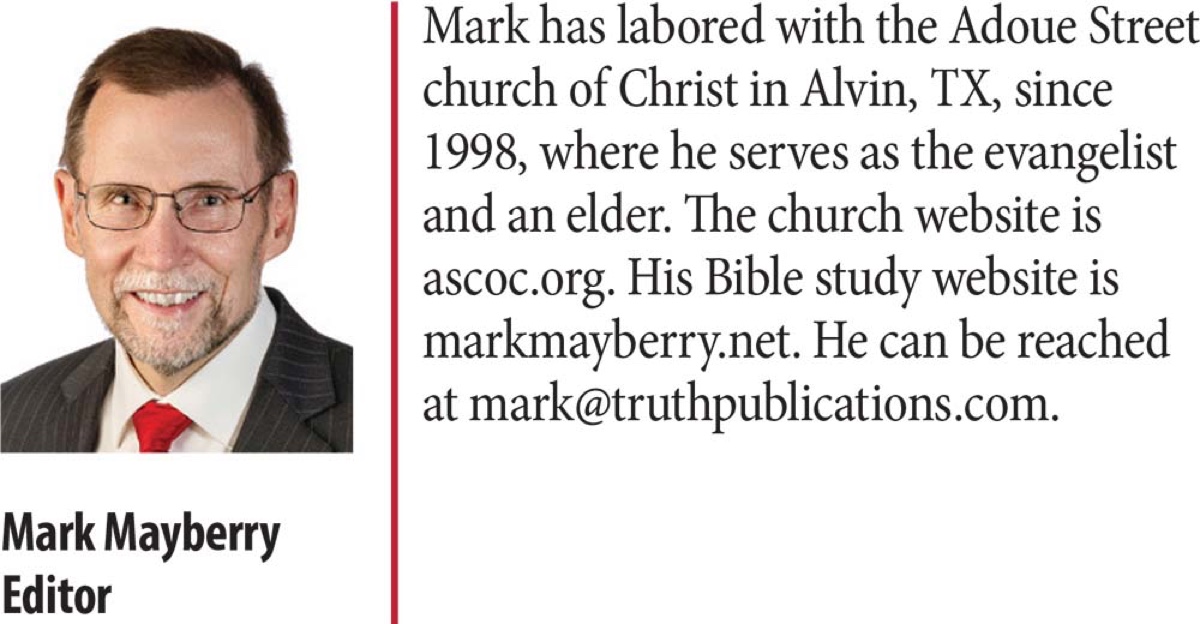by Mark Mayberry
Synopsis: The Bible repeatedly emphasizes the importance of remembering and the danger of forgetting. Let us heed these admonitions and make appropriate application to our lives.
When an elderly husband and wife began forgetting little things, they visited their doctor, who suggested, “Many people find it useful to write brief notes to themselves.” The wife thought it was a good idea, but the husband (as husbands often do) balked. “I don’t need no stupid notepad! My memory is fine!”
After returning home, the wife said, “Honey, will you please go to the kitchen and get me a dish of Blue-Bell ice cream? Maybe you should write it down so you won’t forget?”
“That’s silly!” He exclaimed. “I can remember a dish of ice cream.”
“O.K.” says the missus, “Please put some strawberries and whipped cream on the top. Also, please bring a cookie. Now, can you remember all that?”
“Women!” He muttered. “A dish of ice cream with strawberries and whipped cream. And a cookie.
I. Can. Remember. I don’t need to write it down.”
The husband goes into the kitchen; his wife hears pots and pans banging around. Finally, he emerges from the kitchen and presents her with a plate of bacon and eggs.
She looks at the plate and asks, “Hey, where’s the toast I asked for?”
Merriam-Webster’s Collegiate Dictionary says the verb “forget” means “(1) to lose the remembrance of: be unable to think of or recall (something); (2) to treat (a matter) with inattention or disregard.”
The International Standard Bible Encyclopedia contains an extensive discussion of forgetfulness. While it may simply denote the loss of memory (Gen. 40:23), it also carries the connotation of being heedless, ignoring something important, etc. It can communicate the concept of losing consciousness of something significant, such as forgetting God, His mighty deeds, His name, or the covenant with Him. “Forget” approaches the meaning “to unlearn” in such passages as Hosea 4:6, where the Lord accuses his people of having forgotten the law (parallel to “rejected knowledge”), etc. It may also connote “overlook, neglect, care little for” (Burke, 340-339).
Before crossing over the Jordan to inherit the promised land, Moses warned Israel of the danger of forgetting God: “Beware that you do not forget the Lord your God by not keeping His commandments and His ordinances and His statutes which I am commanding you today. . .” (Deut. 8:11-20). Consider the folly of forgetting God: “The wicked will return to Sheol, even all the nations who forget God” (Pss. 9:17; cf. 50:22-23).
Do not forget His benefits/blessings: “Bless the LORD, O my soul, and forget none of His benefits” (Ps. 103:2).
Do not forget His covenant: “So watch yourselves, that you do not forget the covenant of the LORD your God which He made with you. . .” (Deut. 4:23-24).
Do not forget His deliverance: “Watch yourself, that you do not forget the LORD who brought you from the land of Egypt, out of the house of slavery” (Deut. 6:12).
Do not forget His words/laws: “I shall delight in Your statutes; I shall not forget Your word” (Ps. 119:16).
Do not forget His works/deeds: “They should put their confidence in God and not forget the works of God, but keep His commandments” (Ps. 78:7).
Sacred Scripture is replete with admonitions to “Remember!” The Greek word mimnēskō, translated “recall, remember” means “(1) to recall information from memory; (2) to think of and call attention to something or someone; (3) give careful consideration to” (BDAG, 652). The Lexham Theological Wordbook says it “refers to the action of bringing to mind past events, people, or words and applying that knowledge to the present.”
The verb “remember” occurs 168 times in the NASB, while “remembrance” is found another 16 times. Moses ordered Israel, “Remember the sabbath day, to keep it holy” (Exod. 20:8). Solomon said, “Remember also your Creator in the days of your youth. . .” (Eccl. 12:1). Jesus exhorted disciples, “Remember Lot’s wife” (Luke 17:32). Correcting the corruptions that had crept into their worship, Paul commanded the Corinthians:
For I received from the Lord that which I also delivered to you, that the Lord Jesus in the night in which He was betrayed took bread; and when He had given thanks, He broke it and said, “This is My body, which is for you; do this in remembrance of Me.” In the same way, He took the cup also after supper, saying, “This cup is the new covenant in My blood; do this, as often as you drink it, in remembrance of Me.” For as often as you eat this bread and drink the cup, you proclaim the Lord’s death until He comes (1 Cor. 11:23-26).
While the disciples did not understand the nature of Jesus’s ministry, after the resurrection they remembered his teaching and made accurate application. Namely, the resurrection of Jesus manifested His authority (John 2:18-22, esp. v. 22). The Jews mistakenly thought that the Messianic kingdom would be physical; yet, Jesus’s triumphant entry into Jerusalem manifested, not only His humility but also the distinctive spiritual nature of His reign (John 12:12-16, esp. v. 16).
Simon Peter serves as both a positive and a negative role model. After Judas betrayed Jesus, Peter found himself surrounded by enemies and facing mortal danger. When cowardice replaced supreme self-confidence, Simon thrice denied the Lord—remembering Jesus’s earlier warnings. . . but too late (Luke 22:31-34, 54-62; cf. Matt. 26:75; Mark 14:72; cf. Ps. 137:1-6).
After being baptized in the Holy Spirit on the day of Pentecost, Peter and the other apostles were granted much clearer understanding of God’s redemptive plan (Luke 24:45-49; Acts 1:4-8). Yet, even then, Simon needed an additional vision and demonstration of God’s purpose to understand the universality of the gospel message. After experiencing the vision at Joppa, and seeing the Spirit being poured out on the household of Cornelius, Peter remembered prior teaching of Jesus that applied to the current circumstances (Acts 11:1-18, esp. v. 16).
Paul’s commendable example among the Ephesians served as a reminder of Jesus’s example and exhortation: “In everything I showed you that by working hard in this manner you must help the weak and remember the words of the Lord Jesus, that He Himself said, ‘It is more blessed to give than to receive’” (Acts 20:25-38, esp. v. 35).
The aged apostle also exhorted Timothy to remember foundational facts about our Lord Jesus Christ (2 Tim. 2:8-13, esp. v. 8). “Remember Jesus Christ. . .” compresses the gospel into three words! In like manner, the parallel epistles of Jude and 2 Peter exhort readers to remember the words spoken beforehand by the holy prophets and inspired apostles of the Lord (2 Pet. 3:1-2; Jude 17-21, esp. v. 17).
The danger of forgetting is real. The prophet Hosea declared, “My people are destroyed for lack of knowledge. Because you have rejected knowledge, I also will reject you from being My priest. Since you have forgotten the law of your God, I also will forget your children (Hos. 4:6). Forgetting was distinct danger to ancient Israel, and remains a present peril to contemporary disciples. God will not forget us, but will we forget Him (Heb. 6:9-12)? Don’t forget to study your Bible daily! Don’t forget to pray! Don’t forget to serve others! Don’t forget to assemble! Don’t forget to worship!
The need for remembrance is great! The theme section of this issue of Truth Magazine focuses upon “Remembering Jesus.” Remembering Jesus, in His various roles and responsibilities, His past, present, and future glory helps us endure hardship and remain faithful. Accordingly, we offer the following articles for your consideration: (1) HIS PREEXISTENCE AND INCARNATION, by Tim Reeves; (2) HIS MINISTRY, by Mark Reeves; (3) HIS DEATH AND RESURRECTION, by Luke Reeves; (4) HIS EXALTATION, by Chris Reeves; (5) HIS AUTHORITY, by Jacob Reeves; (6) HIS RETURN, by Steve Reeves.
Arndt, William, et al. A Greek-English Lexicon of the New Testament and Other Early Christian Literature (BDAG). Chicago: University of Chicago Press, 2000.
Burke, D. G. “Forget,” The International Standard Bible Encyclopedia, Revised. ed. Geoffrey W. Bromiley. William B. Eerdmans, 1979-1988.
Merriam-Webster’s Collegiate Dictionary. Springfield, MA: Merriam-Webster, 1996.


